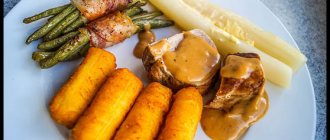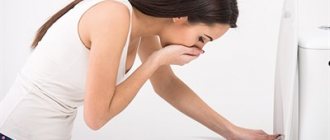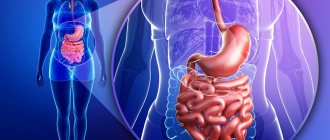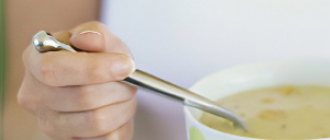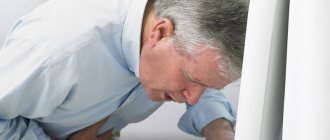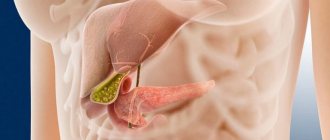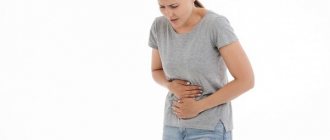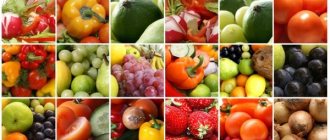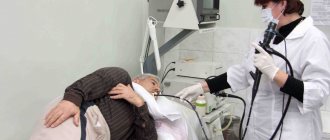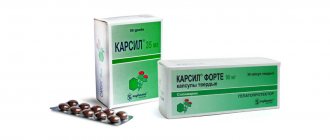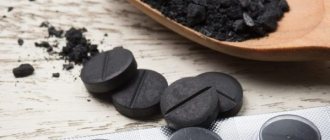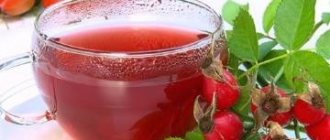Home » Gastroscopy » Selecting a diet before gastroscopy of the stomach
March 31, 2020 Gastroscopy
Preparation for EGD is a prerequisite for obtaining a reliable diagnosis. Otherwise, the data will be distorted and the procedure will have to be repeated. To avoid this, you need to completely rebuild your diet for about a week. However, the diet before gastroscopy of the stomach is not so complicated. It is only important to understand the principle.
Food: list of prohibited foods
Internal examination of the gastric cavity is difficult to overestimate. This method allows not only to carefully examine all questionable areas, but also to take a tissue sample for analysis. However, in order for everything to go smoothly and without disruptions, you need to know what you can eat before gastroscopy and what you can’t.
You need to change your diet about a week before the procedure. The basis should be nutritious, but at the same time easily digestible foods. And the closer the “hour X” is, the stricter the diet should be. First of all, you need to exclude:
- Chocolate;
- Nuts;
- Dairy products;
- Milk;
- Alcoholic drinks;
- Spicy and fatty foods;
- Ketchups, sauces, mayonnaise;
- Carbonated drinks;
- Soda;
- Flour products and bread;
- Fatty meats and fish;
- Mushrooms;
- Pasta;
- Whole grains;
- Coffee;
On the eve of gastroscopy, you should be especially strict with yourself. Take your last meal 12 hours before the procedure. This is one of the most important conditions for a comfortable procedure. A completely healthy stomach can easily cope with leftover food within 8 hours, but if there are even the slightest disturbances, the process becomes more difficult. In addition, at night, processes in the body slow down, which further complicates the process. And by the time of the examination, the stomach should be completely empty.
And now another, quite reasonable question is brewing: if the stomach should be empty, is it possible to drink water before an FGD? It is undesirable, but there are no strict restrictions here. If you really want to, you can drink about 100 ml of pure distilled water or weak tea three hours before the endoscopy. Naturally, you cannot eat or drink before the procedure itself - this will fill the stomach cavity and interfere with obtaining reliable data.
Diet before gastroscopy of the stomach
In order for the discomfort experienced by the patient during gastroscopy to be minimal, and for any interference that prevents the examination of the walls of the stomach to be completely absent, the organ being examined must be freed from particles of undigested food. A special diet that contributes to the implementation of this important task should be followed for 48 hours preceding the gastroscopy procedure. Compliance with all its requirements will allow the patient not only to tolerate the process of diagnostic examination of the stomach well, but also to quickly get rid of irritation of its mucous membranes.
On the eve of the study
If there is one night left before the test, the first thing you need to do is calm down. Have an early dinner, choosing something easily digestible for this. For example, here is what you can safely eat in the evening before gastroscopy of the stomach:
- Mashed potatoes;
- Buckwheat;
- Boiled white meat;
- Lean fish;
- Steamed vegetables;
Calculate how many hours the study will take place and set a time for dinner. You should not eat fresh vegetables or fruits. This will make it difficult for the endoscope to pass through. Pay special attention to ensure that the temperature of the food is not too low or too high.
An ideal option if preparation for gastric gastroscopy lasts throughout the whole day. Try to eat as little as possible at a time, but keep your meals frequent. You should eat soft, liquid or mushy foods. This will make the leftovers easier to digest. Remember, what we eat remains in the body for a long time. And if you have an in-depth study, for example, esophagogastroduodenoscopy, it is better to refuse anything that causes even the slightest difficulty in digestion.
After dinner, monitor the condition of your intestines. If you have the slightest complaint of flatulence, take a carminative. This may seem like an unnecessary precaution to you, but for gastroscopy of the stomach, a completely empty gastrointestinal tract is important. This is primarily more comfortable for the patient himself.
Carrying out the procedure
Before FGDS, it is advisable to remove jewelry, glasses, and dentures.
In the treatment room, the patient is placed on the couch, on the left side, and the mouth is treated with an anesthetic solution. Gastroendoscopy using anesthesia is performed while lying on your back.
The doctor inserts a tube into the patient through the mouth, sometimes through the nose. The person being examined is asked to make a movement as if swallowing, which allows the device to be advanced into the esophagus.
The doctor examines the required areas. During gastroscopy with biopsy, tissue and gastric juice are taken for bacteriological study.
The therapeutic endoscopic method allows you to perform surgery to eliminate polyps and remove foreign objects from the stomach.
Endogastroscopy can be prescribed not only for an adult, but also for a child.
In children, the mucosa is thin, the muscles of the walls are poorly developed. In these cases, a flexible endoscope with a smaller diameter is used for gastroscopy. For children under 6 years of age, the procedure is performed with immersion in sleep. For older children, general anesthesia is prescribed if the child is in serious condition and the examination takes a long time.
After research
After gastroscopy, it is advisable to follow the following rules:
- Do not move abruptly; you need to sit quietly for 15 minutes; after FGDS with biopsy, medical workers themselves will ask the patient to maintain a horizontal position for some time.
- After the procedure, it is not recommended to eat or drink for two to three hours; it is advisable to eat properly, abstaining from heavy foods. Light food - oatmeal, yogurt; After a while (1-2 days), you can introduce other foods into the diet.
- Do not drink alcoholic beverages, especially after the examination under anesthesia.
- Do not smoke for 1 hour.
- After a biopsy, not following proper nutrition is risky, the mucous membrane is injured; Eating hot food can lead to stomach upset, even ulcers. You need to eat warm food that does not contain chemical additives or coarse fiber. It is advisable not to take pills for 24 hours after the procedure.
Contraindications:
- aggravated stage of bronchial asthma;
- mental disorders;
- myocardial infarction in the aggravated phase;
- gastroscopy during pregnancy is safe if performed in the first trimester or the beginning of the second;
- there are no contraindications for menstruation;
- with transnasal gastroscopy (the tube is inserted through the nose), a runny nose is not a contraindication.
https://youtu.be/GnTAOxBJriE
Important nuances
An increased content of mucus in the body can interfere with the study or even disrupt the procedure. To avoid this, follow a number of simple rules the evening before the FGS:
- Stop smoking the night before and the morning before the procedure. Otherwise, you will suffer from vomiting mucus, which may disrupt the procedure;
- Only in exceptional cases are patients allowed to take medications with water before the procedure. This is discussed individually with the attending physician;
- It is forbidden to drink dairy products on the day of the procedure and the day before. In addition, milk drunk in the morning is considered food, not a drink;
- In the morning before FGS, you should not brush your teeth;
Before gastroscopy it is allowed:
- Administering injections such as insulin;
- Take medications in the form of drops;
- Use lozenges;
What can you drink?
The range of drinks that you can drink while following a special diet before gastroscopy is quite diverse.
The patient is allowed to use:
- decoctions of blueberries or rose hips;
- herbal teas with anti-inflammatory effects;
- compotes made from both fresh and dried fruits;
- mineral table waters that do not contain gas;
- weak black or green tea;
- fruit juices;
- berry fruit drinks.
The temperature of drinks that we are used to drinking cold should be close to room temperature, and tea should not be too hot. It is better to use honey to sweeten tea. The amount of sugar added to drinks should be moderate.
Patients should avoid drinking alcoholic beverages of any strength (including beer with low alcohol content) at least 24 hours before the scheduled examination.
Essentials
Instead of being needlessly nervous when getting ready for an examination, occupy your thoughts with useful information. Check if you have everything on the list with you:
- Direction;
- Outpatient card;
- Passport;
- Results of previous analyses;
- Data from previous FGS (if any);
- Medicines and injections if you are hypertensive or diabetic. Drugs that you use regularly;
- Sterile gloves;
- Small towel;
- Wet and dry wipes;
- A bottle of clean, distilled water;
And most importantly, don’t worry, think about your breathing, watch it. During the procedure, this not only helps to distract you, but also helps the gastroscope to quickly pass into the throat. Inhalations and exhalations should be smooth, deep and performed through the mouth.
When should you stop eating?
You must come to the FGS on an empty stomach
How many hours before EGD should you stop eating? Is it possible to eat in the morning if FGDS is scheduled for the second half of the day? It depends on how quickly the organ copes with its digestion function. As a rule, it is recommended to limit the intake of any foods after 7 pm on the eve of esophagogastroduodenoscopy, provided it is carried out in the morning. If the stomach quickly copes with its task, then it is possible to stop taking it within 9-10 hours.
You can eat before the FGDS, scheduled for the afternoon, early in the morning. There must be at least 9 hours left before the FGS. It is best to play it safe and not eat at this time, since if there are food residues in the organ, the gag reflex will interfere with the insertion and removal of the endoscope from the digestive tract. This can damage the inner wall of the esophagus and stomach. In addition, the procedure will have to be postponed, because it will no longer be possible to reinsert the gastroscope.
Contraindications
This diagnostic method has its contraindications. It is not indicated if the patient has:
- recent heart attack or stroke;
- severe renal or liver failure;
- acute infectious diseases;
- acute psychotic disorder;
- disruption of rhythm;
- cachexia;
- extreme obesity (in some cases);
- hemophilia.
For emergency manipulation, gastroscopy can also be done if you have a cold. If suddenly the illness occurs at the time of the scheduled appointment, it is better to postpone the endoscopy until recovery.
The fact is that most often with colds, the infection is localized in the nasopharynx and larynx. There is a high probability that, together with the endoscopic tube, which will move through the infected oral cavity and pharynx, it will “introduce” an infection into the stomach.
Alternative methods of oral debridement
To eliminate the unpleasant odor, patients can use special liquids sold in pharmacy chains to sanitize the oral cavity. When used correctly, they will not only provide fresh breath, but also destroy germs, as they have an antibacterial effect. Also, for these purposes, experts recommend using sprays that can completely replace chewing gum. If patients use rinsing solutions and refreshing sprays to eliminate unpleasant odor from the oral cavity, then they need to ensure that they do not swallow liquids, since their components, after penetrating into the gastrointestinal tract, can distort the results of studies.
Frequent abdominal pain leads to the fact that the patient has to visit a gastroenterologist. Establishing an accurate diagnosis of such symptoms is quite problematic, so the doctor prescribes an FGDS examination. Using a gastroscopic examination, it is possible to examine the esophagus, stomach and duodenum. Based on the study, a diagnosis is made and treatment is prescribed. It would seem that everything is very simple and fast, but this is only until the patient finds out what gastroscopy is.
Who is not prescribed FGDS?
Despite the fact that fibrogastroduodenoscopy is one of the most informative diagnostic techniques, there are a number of contraindications to its implementation. It is prohibited to perform studies on patients with the following pathological conditions:
- mental disorders;
- heart attacks or strokes;
- hypertensive crisis;
- chronic infectious diseases of the gastrointestinal tract during exacerbation;
- unconscious state;
- pathologies in the hematopoietic system;
- previous surgical intervention on the larynx;
- exacerbated asthma (bronchial).
For patients who have the above diseases, specialists select safer diagnostic methods. But, if the result of FGDS is vital for the patient, he is examined regardless of his condition.
Ban on using toothpaste
Gastroenterologists prohibit the use of any dental cleaning products, and the ban applies not only to pastes and powders: even simple cleaning of plaque with a clean brush is undesirable. This is due to the fact that eliminating plaque on teeth increases the human body’s readiness for the gag reflex.
In addition to strengthening the gag reflex, the use of toothpastes and powders affects the following indicators:
- Composition of microflora. If it is suspected that inflammation of the gastric wall is caused by bacteria, a small amount of mucus produced by the organ is taken into a culture tank. But the result will be unreliable if a small amount of mouth cleanser gets into the stomach with saliva.
- Acid-base balance. If a disorder in the production of hydrochloric acid is detected, even a small amount of dental cleaning agent entering the stomach may interfere with the reliability of the analysis. Why? It is probably worth remembering the recommendations of people suffering from frequent heartburn, who advise eating a small amount of tooth powder or toothpaste to reduce the burning sensation in the stomach. Indeed, these hygiene products have an alkaline structure and help reduce acidity.
- Increased gastric secretion. The release of gastric juice is provoked by smoking, chewing gum and brushing teeth.
To reduce the gag reflex and increase the reliability of tests taken during a stomach examination, it is better to refrain from morning oral hygiene.
